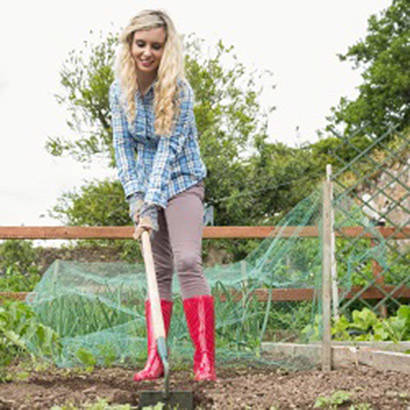
The Oxford Park Commission’s community garden program began several years ago when the Oxford Community Garden Association approached the Commission about starting a community garden on unused public land next to the city’s skate park. Located in a non-residential area, the garden now has 33 plots, totaling 14,000 square feet, including nine plots designated for youth.
The goal of the garden is to provide opportunities for community members to grow food for themselves or others in need. Involvement in the garden is open to anyone in the community for a $10 fee, and it has a diverse group of participants, from children to retirees. Several of the plots are used by the Oxford Community Garden Association to grow food for donation to the food pantry and directly to people in need. The program has become so popular that there is often a wait list for plots. The Park Commission furnishes soil, mulch, and other supplies while the city supplies water and maintains the water lines. Although some start-up costs were paid by the NRPA grant, Bubba Robinson, Deputy Director of the Park Commission, is confident that the costs of sustaining the program will be handled by the Commission’s operating funds, at least for the foreseeable future.
A group of children became interested in gardening well before the community garden existed in the city park. Several years ago, a college student working in the Park Commission’s summer internship program conducted a youth gardening workshop as her required project. She taught the children basic gardening skills and showed them how to plant containers using plants, soil, and pots donated by Home Depot and garden centers. Mr. Robinson commented, “Of course, all of us said you’re probably not going to get any kids. I think she ended up with 28!”
The youth gardening program operates in two ways. One is the youth designated plots in the city park, in which families pay the rental fee and work in the garden. The second is a large plot in the park which has been used by a second-grade class in a nearby school. Mr. Robinson observed, “You can involve a lot of kids through the schools. And … we had that one class, there were 20-some students in this teacher’s class who came down at least once a week to the garden, so there [were] 20- some kids that may have not ever been able to work a garden and see how it operates, or see how to grow anything, if it hadn’t been for the community garden.” However, because the children had to walk, they didn’t get to work in the garden often enough. The Park Commission, along with the school, is exploring the feasibility of building a garden on the school grounds. With the involvement of a volunteer who works with school groups to help them start gardens and the classroom teachers, Mr. Robinson is optimistic that it will be an easy transition for the second graders to start a new garden at their school. He also hopes that with the Park Commission’s help, other local schools will start gardens. In addition, he plans to link up with local youth organizations, such as 4H, and help them to start gardens.
The garden’s most active partnership so far has been with the Oxford Community Garden Association, which provides expertise and speakers so that anyone who is interested in learning more about growing food can find out how to do it. According to Mr. Robinson, “The [Oxford Community Garden] Association has been outstanding to work with. … Anyone who looks to do a community garden or has already got one and is having trouble maintaining it themselves, a good organization like that is outstanding.”
Starting a farmers’ market is a hoped-for outgrowth of the garden program. There is already a farmers’ market in Oxford, but it is not open to everyone who has produce to sell. Mr. Robinson envisions starting a market where people who have garden plots in the city’s program or anywhere else around town could sell their produce. An advisory committee will soon be formed to explore the feasibility of this project.
Mr. Robinson views the garden program’s major success as “…just keeping all the plots full. Because when we first started, I didn’t think it would be that big. But now we can’t keep enough plots!”
